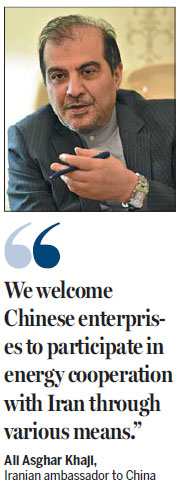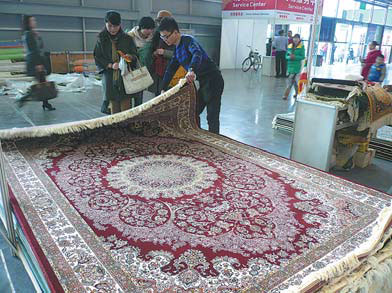Belt and Road to enhance China, Iran relations
Iranian government welcomes initiative, ambassador says
China's Belt and Road Initiative will bring more opportunities for the development of ties with Iran, the Iranian ambassador to China said.
"In the history of the ancient Silk Road, Iran played an important role as a bridge linking China and European countries," Ambassador Ali Asghar Khaji said on Jan 15.
The Iranian government welcomes the Belt and Road Initiative put forward by Chinese President Xi Jinping in 2013, Khaji said, adding that the top leaders of both countries have discussed related issues during their meetings in recent years.
The initiative, with a focus on infrastructure, refers to the Silk Road Economic Belt and 21st Century Maritime Silk Road. The initiative proposes using trade and investment to boost ties along the ancient trade routes.
"Iran has been participating in Belt and Road-themed meetings, seminars and forums hosted by the Chinese government every year," Khaji said, adding that the Iranian authorities have also held seminars to discuss the initiative.
During Xi's visit to Iran on Friday and Saturday, both sides were scheduled to sign memorandums of understanding on the initiative to lay a base for future cooperation on projects, he said.
Iran has set up a special committee of members from government departments, enterprises and business chambers to enhance cooperation with China, he added.
The ambassador said he believed the Belt and Road projects could boost economic development of countries along the routes and bring peace and stability to the region.
He said China is one of the world's largest energy consumers and importers, while Iran has the richest reserves of gasoline and natural gas, which provide more potential for cooperation.
"We welcome Chinese enterprises to participate in energy cooperation with Iran through various means," Khaji said, adding that such topics will also be discussed during Xi's visit.
On Jan 16, the government of Northwest China's Xinjiang Uygur autonomous region announced it would start preliminary work on a railway linking China with Iran via Kyrgyzstan, Tajikistan and Afghanistan within five years.
The railway is expected to run from Xinjiang's Kashgar to Afghanistan's Herat, then through Kyrgyzstan and Tajikistan to finally connect with the Iranian railway.
Conducting preliminary work on the railway is listed in the draft of the region's 13th Five-Year Plan period (2016-20) that is being reviewed by the regional people's congress.
Representatives of transport ministries and railway departments from the five countries signed an agreement on the railway in a meeting in December 2014, Xinhua News Agency reported.
Last year, Xi met with Iranian President Hassan Rouhani twice, and both leaders have vowed to enhance cooperation.
While attending activities marking the 70th anniversary of the establishment of the United Nations in September, Xi told Rouhani in New York that China is ready to join with Iran to seize the opportunities presented by Iran's nuclear deal and continue to advance bilateral ties and practical cooperation.
China is willing to work with Iran to prioritize joint projects in infrastructure construction and interconnectivity and expand cooperation in fields such as railways, roads, steel, car manufacturing, electricity, advanced technologies and environmental protection, Xi said at the time, adding that cooperation in the energy and financial sectors should be given priority.
Rouhani said Iran cherishes its friendly ties with China and is willing to work with China to maintain close high-level exchanges and deepen long-term strategic cooperation in such fields as economy, trade and energy.
The meeting came two months after a multilateral deal - in which China played a key role - ended the 12-year Iran nuclear issue.
Under the deal, endorsed by the UN Security Council, sanctions on Iran imposed by the United States, the European Union and the United Nations will be lifted. In return, Iran will curb its nuclear program for a decade and get rid of 98 percent of its stockpile of enriched uranium.
Some Western countries have long suspected that Iran aims to create a nuclear bomb, but Teheran said the materials were only for civil use. China has long opposed unilateral sanctions on Iran by the US and Europe, and has objected to threats of force.
China-Iran trade volume reached $51.85 billion in 2014, growing by 31.5 percent year-on-year. China mainly exports machinery, textiles, chemical and steel products, and imports crude oil, mineral ore and agricultural products in the bilateral trade, according to the Chinese foreign ministry.
Consensus reached
In December 2015, a seminar on China-Iran Cooperation for Development of the Belt and Road Initiative was held in Haikou, Hainan province. Senior officials from government departments, the Iranian embassy to China, business chambers and think tanks attended the three-day seminar.
According to a consensus agreed to at the seminar, China and Iran hope to jointly promote the construction of the Belt and Road and the China-Central Asia-West Asia Economic Corridor, to strengthen political relations, economic ties and sociocultural communication.
The two countries look forward to the construction of the Belt and Road under the principles of joint discussion, joint development and mutual sharing, to build a community of shared interests, joint responsibility and common destiny, and to achieve policy dialogue, infrastructure connection, trade integration, financial fluidity and people-to-people dialogue.
Both countries agreed to organize government think tanks and businesses to attend a One Belt and One Road Karamay Forum in August of this year, to promote project cooperation between China and Iran.
Farzam Kamalabadi, an Iranian-American strategist who is board chairman of the Future Trends Group in Shanghai, said China's plan to revive the ancient Silk Road has provided an opportunity for the exchange and communication of different cultures and civilizations, including between China and Asia, Islamic Arabs and Iranians, and the Christian West.
"If China could fully and smoothly implement the initiative, about 70 to 80 percent of the world's population will benefit directly and the whole world order will be better united," he said. "It's a great win-win strategy."
Chi Fulin, director of the China (Hainan) Institute for Reform and Development, said China and Iran should establish a stable and sustainable energy partnership and jointly build up the energy economic cooperation circle along the Belt and Road route.
China could work with other Belt and Road countries including Iran to construct energy process parks, new-energy industrial parks and cross-border energy economic cooperation zones, and thus explore methods to facilitate investment and energy trade, he said.
anbaijie@chinadaily.com.cn

|
Persian carpets, made in Iran, are displayed at a trade fair in Chengdu. The Belt and Road Initiative is expected to bring more Iranian goods to the Chinese market. Wang Jun / for China Daily |
(China Daily 01/23/2016 page6)















